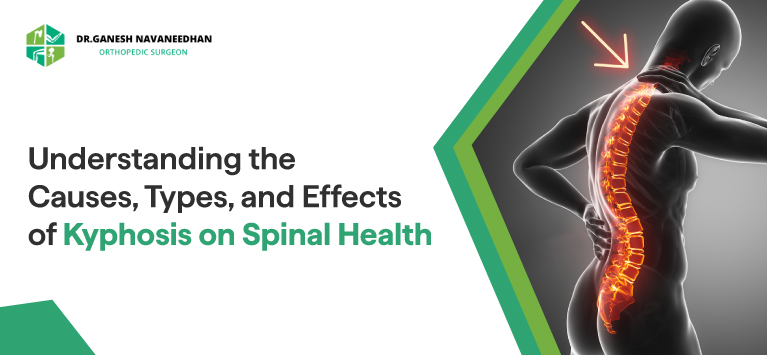- +91 62384 78716 +91 99475 78797
-
Sasthamangalam, Trivandrum
Sasthamangalam, Trivandrum

Do you often find yourself slouching or hunching over while working? Do you suffer from back pain? If you answered yes to either of these questions, then you may have kyphosis.
Kyphosis, also known as hunchback or roundback, is a spinal disorder that causes a forward rounding of the upper back. A slight curve is standard, but excessive curvature may lead to pain and discomfort as there are types of kyphosis that depend upon the incidence and genetics.
In this blog, let’s learn about the causes, types, and effects of kyphosis and treatment options for kyphosis.
Kyphosis, also known as the dreaded hunchback posture, can be caused by various factors. One major cause is poor posture. Sitting for extended periods can be pretty harmful to your back. So, if you’re constantly bending to touch your toes with your chin, it’s a good idea to sit up straight.
But that’s not all. There is another factor, i.e. osteoporosis. When your bones get weak and break easily, like a dry tree branch, they can’t correctly hold up your spine, leading to a bent and unattractive posture. So, everyone, make sure to take your vitamins and drink milk for stronger bones.
Sometimes, kyphosis can be something you have from birth. This occurs due to the influence of genetic factors, affecting the visual appearance of the back.Additionally, there’s Scheuermann’s disease, a condition that alters the vertebrae, causing them to wedge together.
So, these are the reasons behind kyphosis: delicate bones, family traits, and a spine situation where everything aligns smoothly.
There are different kinds of kyphosis, which have other causes, symptoms and complications. Let’s explore some of the common types:
Postural kyphosis is the most common type, which is caused due to poor posture. Most of us spend our time bending our hunch while using mobile, laptops and desktops, so it is not surprising when it leads your backbone to get settled in the posture. The good thing to note is we can fix it with exercises and therapy that help to improve your posture.
Like postural kyphosis, Scheuermann’s kyphosis also tends to appear during adolescence. It is caused by abnormalities in the spine’s structure and results from structural changes in the vertebrae, leading to wedging and curvature. This condition causes a visible hunchback or roundness of the upper spine, along with stiffness and mild discomfort. Treatments like exercises, wearing braces, and sometimes spine surgery can fix the bend in the spine.
One type of kyphosis that exists from birth is called congenital kyphosis. The improper growth of the vertebrae in the womb is the cause. The impact of this condition can vary, ranging from mild to severe, depending on the extent of spinal malformation. Treatment options for congenital kyphosis may involve bracing or corrective surgery, with the choice dependent on the severity of the spinal curvature.
Due to ageing and changes in the spine, a condition known as degenerative kyphosis causes the upper back to bend forward. Osteoporosis generally weakens the spine, which can result in compression fractures. A hunched posture, pain, and limited range of motion may arise from this curvature. In order to treat discomfort, exercises are recommended, and in extreme situations, surgery.
It is a spinal condition that is growing more prevalent and can have a number of severe effects on the body. Now, let’s examine how kyphosis affects the health of the spine.
Don’t be scared! There are ways to prevent and treat kyphosis. Physical therapy, exercises, bracing, and, in severe cases, advanced spine surgery can all contribute to improving spinal health and reducing the effects of kyphosis.
Remember, your spine works hard for you, so show it some love with good posture, regular exercise, proper lifting techniques, and breaks from sitting.
In a nutshell, kyphosis can cause surprising changes to your spine, but with the right treatments and habits, you can straighten things out. So keep your back straight and your chin up because a healthy spine is the backbone of a happy life!
Copyright © 2025 Dr. Ganesh Navaneedhan. All Rights Reserved. | Designed By Harvee healthcare